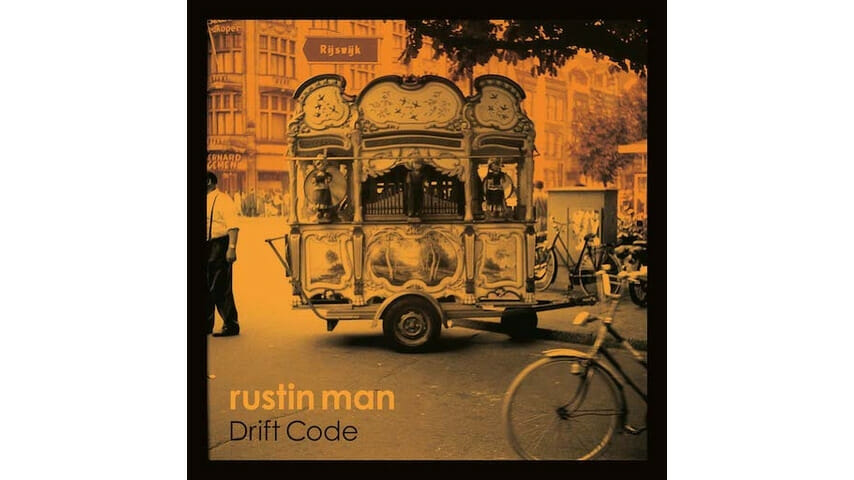
Depending on the song, and even on the verse, Rustin Man’s Paul Webb either sounds like an Appalachian mountain man singing through diastema or David Bowie, not the combination anyone might expect but surprisingly the combination we all deserve. The idiosyncratic aural read on Webb’s new album, Drift Code, arriving a staggering 17 years after Out of Season, his 2002 collaboration with Beth Gibbons, is key to its spirit. His music feels right at home both on Earth and in outer space, an ode to British folk washed in reverb and wrapped in cosmic peculiarities.
Webb doesn’t even try to disguise the family resemblance. Instead he leans into it. “Left up here in space, I’m part of the Milky Way,” he croons on the sixth track, “The World’s in Town.” “I’m drifting from day to day and everywhere feels like my home.” He addresses the line to someone far away, smiling at him from their “station,” contenting himself with the tripped out fate of getting stoned among the cosmos. The image is certainly striking, but the melancholy wrung out of Webb’s vocal delivery gives the song endurance, sustained over a cascading piano interrupted by the boom of snares and the psychedelic urging of a wah-wah pedal.
Drifting is the record’s bread and butter, maybe even its mission statement, couched right in its title. Start to finish, Drift Code encapsulates a journey unto itself, a tad overlong even at a scant nine tracks—“All Summer,” the capper, while lovely, feels extraneous to the function of the album—but worthy all the same for sheer innovation. Old as Webb’s references, intended or not, are, they metastasize into a singular work. Disparate as its identity appears on first listen, it’s surprisingly cogent on a second run through. Drift Code’s mesmeric powers take time and patience for best effect to settle in, which might be a big ask for an investment clocking in at a half an hour and change. But what Webb has created is so rich, so delightfully off-kilter, that an auxiliary listen is necessary the same way another sip of pickleback is necessary.
The sounds and styles comprising Drift Code’s aesthetic should clang against each other on paper. Funneled into the ear they blend, but the blending takes patience to acclimate to. It’s an odd listen, not an easy listen, which isn’t to say that it’s hard to sit through, either, just unexpected. Every once in a while Webb coaxes the listener down from the solar system and into the public house with tracks like the piano-driven “Light the Light,” the most old school Waits-ian ditty of the bunch and the most immediately recognizable for its predominant jazz, vaudevillian qualities. Arguably it’s the best song in Drift Code’s collection, and maybe the one that should be heard first, even before the opener, “Vanishing Heart.”
“Light the Light,” on close inspection, reads like a heads up. “There’s a grand highway out here, waiting for you to let go,” he urges his audience, clueing them in to Drift Code’s oddities. Don’t go in anticipating that the record embodies one sound and one sound only. Let go of your preconceptions. Otherwise, you’ll end up drifting in the Milky Way.
If one style especially anchors Drift Code, it’s folk, but Webb, in keeping with its constantly fluctuating character, uses his various influences to move it forward. Folk is perhaps the most human of musical genres, or at least the one that bears the strongest connection to age-old and universal human experiences, from heartbreak to oppression, all in service to creating cohesive documents of cultural traditions. As our cultures evolve, so too does folk music. It was always destined for the stars. Webb’s work takes it one step closer to getting there.
Boston-based culture writer Andy Crump has been writing about film and television online since 2009 (and music since 2018). You can follow him on Twitter and find his collected writing at his personal blog. He is composed of roughly 65% craft beer.